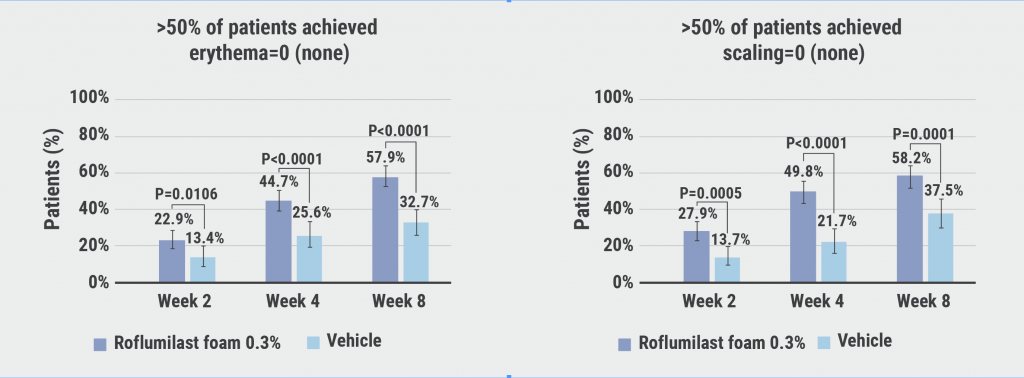https://doi.org/10.55788/aa8e43cb
Is there a relationship between vitamin D levels and the prognosis of melanoma patients? This was the question that Dr Inés Gracia-Darder (Son Espases University Hospital, Spain) and her colleagues strove to answer in a retrospective cohort study [1,2]. The 264 investigated patients were treated between 1998 and 2021 for invasive melanoma in the Hospital Clinic in Barcelona and had their 25-hydroxyvitamin D3 levels determined after diagnosis. The study participants were assigned to 1 of 2 groups: those with a vitamin D level <10 ng/mL deemed ‘vitamin D deficient’ and those with levels ≥10 ng/mL, who were referred to as ‘normal/insufficient’. Not only the potential association of overall survival but also the melanoma-specific survival with the plasma levels of vitamin D were analysed.
The baseline characteristics were not significantly different between the study groups. The median age was 57.5 years, 54.2% of participants were women, and the majority had a skin phototype 2 or 3‒4. Regarding the melanoma specifics, 63.8% had a superficial spreading subtype, median Breslow index was 1.50 mm, and most tumours were situated on trunk and extremities (45.7% and 34.5%). In more than half of the participants, vitamin D had been measured between October and March.
The results established a reduced overall survival for participants who were vitamin D deficient in the univariate data assessment with an HR of 2.34 (P=0.007). This finding was corroborated in the following multivariate regression that adjusted for possible confounders like age, gender, season of vitamin measurement, and Breslow index (HR 2.45; P=0.007). Interestingly, having a deficiency in vitamin D did not lead to a decreased melanoma-specific survival in both the univariate and the multivariate analysis (P=0.511 and P=0.629). “Previous research has identified that normal levels of vitamin D play a protective role in melanoma survival, and this study aimed to further understand this relationship. Our findings suggest that vitamin D has a significant impact on people with melanoma, showing in particular that vitamin D deficient patients have a lower overall survival, independent of several confounders” Dr Gracia-Darder commented.
Considering these results, more insights are desirable to establish the definite role of vitamin D deficiency in melanoma. The currently active, Belgian, phase 3 ViDMe trial (NCT01748448) that investigates the influence of vitamin D supplementation on malignant melanoma after surgical removal of the primary tumour could shed more light on this matter.
- Garcia-Darder I, et al. Worse overall survival associated with vitamin D deficiency in melanoma patients. P0762, EADV Congress 2022, Milan, Italy, 7–10 September.
- Garcia-Darder I, et al. Melanoma Res. 2022;32(5):384‒387.
Copyright ©2022 Medicom Medical Publishers
Posted on
Previous Article
« High potential for secukinumab as next biologic treatment for HS Next Article
Genital psoriasis: high prevalence, often underdiagnosed »
« High potential for secukinumab as next biologic treatment for HS Next Article
Genital psoriasis: high prevalence, often underdiagnosed »
Table of Contents: EADV 2022
Featured articles
Letter from the Editor
Psoriasis and Psoriatic Arthritis: What You Need to Know
Novel oral psoriasis drug maintains efficacy over 2 years
A3 adenosine receptor agonist showed modest efficacy but excellent tolerability
Selective IL-23 inhibitor achieves long-term disease control in many patients with active PsA
AI machine learning algorithm useful in early detection of PsA
Novel Developments in Sun Protection
Myths regarding “health benefit” of suntan prevail in majority of population
Fern extract reverses severe actinic keratosis lesions
Vitiligo in 2022
Enhancing re-pigmentation rates with topical ruxolitinib in all body areas
Markedly lower skin cancer risk in vitiligo patients
Pruritus Treatment: Novel Agents Entering the Arena
Dupilumab leads to clinically relevant improvements in signs and symptoms of prurigo nodularis
Nalbuphine: aspiring to become another treatment for prurigo nodularis?
Notalgia paresthetica: may κ-opioid receptor agonists be a long-awaited effective therapy?
Pharmacotherapy in Hidradenitis Suppurativa: New Opportunities
High potential for secukinumab as next biologic treatment for HS
Hidradenitis suppurativa: TYK2/JAK1 inhibitor shows promise
Best of the Posters
High rate of non- or partial responders jeopardises therapeutic success in HS
Genital psoriasis: high prevalence, often underdiagnosed
Decreased overall survival in melanoma patients with low vitamin D
News in Atopic and Seborrheic Dermatitis
Baricitinib possible therapeutic option for children with AD
Amlitelimab therapy leads to sustained decrease of IL-22 in AD patients
IL-13 inhibition with lebrikizumab shows high maintenance rates in AD
Does 8 weeks of emollients use prevent AD in high-risk infants?
Roflumilast foam led to high response rates in seborrheic dermatitis
What Is Hot in Hair Disorders?
Long-term improvement in alopecia areata with ritlecitinib therapy
Topical gel plus finasteride beneficial for patients with androgenetic alopecia
Deuruxolitinib achieves hair regrowth, even in patients with severe alopecia areata
Related Articles

November 5, 2022
Letter from the Editor

November 5, 2022
Roflumilast foam led to high response rates in seborrheic dermatitis
© 2024 Medicom Medical Publishers. All rights reserved. Terms and Conditions | Privacy Policy
HEAD OFFICE
Laarderhoogtweg 25
1101 EB Amsterdam
The Netherlands
T: +31 85 4012 560
E: publishers@medicom-publishers.com

